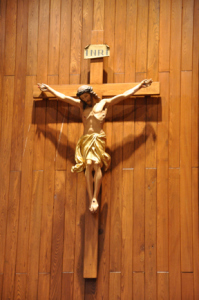Ellen Gable's Blog, page 52
March 27, 2016
Easter Favorites and Easter Memories
Happy Easter! I’m joining Carolyn Astfalk today at her blog for an Easter link up.
We have had a very busy Triduum with my husband as Cantor as all the Masses and me as Lector.
Easter is somewhat different from the way it used to be when our boys were very small. But we still fill Easter baskets!
Favorite Easter Hymn:
Favorite Chocolate:
President’s Choice Dark Chocolate Peppermint Melts
Favorite Easter Memory:
In 1967, when I was nearly eight years old, my mother was in the hospital in critical condition. Back in those days, children were rarely allowed to visit patients in critical care. I wrote her many letters (like the one below), but rarely could she answer any of our letters because of her illness. A few days before Easter, my father had arranged it with the nurses to allow my three siblings and myself to visit her on Easter Sunday because it was the end of March and also was very close to her birthday. We hadn’t seen her in over a month so I was thrilled to be able to be with her and talk to her again. My first view of her was sitting in a wheelchair, her complexion very pale and I remember being surprised at how thin she was. In fact, my oldest brother could put his fingers around my mother’s wrists they were so small. Mom, at five feet six inches tall, was normally about 110 pounds. When we saw her that Easter day, she weighed about 85 pounds. I didn’t care how she looked, though. I was so excited to see her again after so long. Later, whenever my mother would recall that day, she said that while she was happy to see us, just a few minutes with us tired her out so much that she wound up sleeping most of the rest of the day! Thankfully, Mom made a complete recovery from that illness (and, in fact, gave birth to another child!). She eventually passed away nine years ago. In fact, tomorrow is her birthday. Here is an article I wrote about her several years ago.
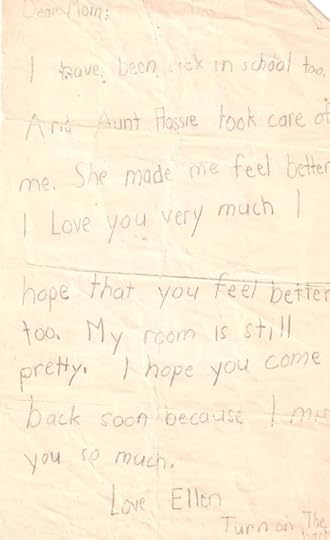
copyright Ellen Hrkach
Favorite Easter Photos Collage:
Top Left: James and I, our first Easter together, 1980
Right: Easter 2003, with my boys dressed (as they used to like to say)
the brothers in Seven Brides for Seven Brothers
Bottom Left: My sibs and I, Easter 1962



March 23, 2016
The Cross and Easter Morning
Photo by Ellen Hrkach
I’d like to share this beautiful article by Catherine Doherty, foundress of Madonna House in Combermere, Ontario.This Holy Week and Easter Week, I meditated much on the Cross and on the Resurrection. And I was struck at the power of the Liturgy to bring those two together. From the very beginning of Lent, the crescendo of the Liturgy of the Church brought us to Good Friday… Her day of mourning… Her day of loss.
Yet even during the Triduum of Holy Week, even on Good Friday itself, anyone attuned to the Liturgy — the Church’s school of love and knowledge — could sense that behind the darkness of Good Friday, already the light of Easter was shining.
Likewise, anyone could sense that during the tremendous joy that filled the Church and her liturgy during Easter and Easter Week, the shadow of the Cross was not far.
It came to me then, that this was the answer to our every day, ordinary, Christian life. That this inter-weaving of light and dark, of joy and sorrow, of pain and absence of it, was a pattern that the Church through her Liturgy brought before the eyes of her children to prepare them for the reality of their earthly lives.
It taught them beautifully and powerfully that the lot of human beings was this symphony of alternating pain and sorrow, joy, and gladness.
Better than any psychiatrist, it pointed to the immense realities of life, never allowing her children to wander into a dream world of their own that would take them far away from the Cross and the Resurrection, into a world of their own making, full of idols, fashioned by their own hands, and oh, so dangerous to the welfare of their souls.
Cross and Empty Tomb
Through her liturgy, the Church by pointing to the inseparableness of the Cross from the empty Tomb, taught her children all about hope. Saying, in effect, that when things seem all wrong, practically hopeless, that is the time when hope should be at its strongest.
For each one of us must have his Good Fridays, but each one must always remember that Good Friday is only the beginning of the story of Love. That it leads to Easter mornings, and eventually to the final Easter morning — to the home coming, to the Beatific Vision.
At the same time, the Church through her liturgy, teaches us that when we experience great moments of joy and gladness — which, of course, God in his mercy always gives us, his beloved children — we must not expect that they will last all our lives, for like the newly baptized catechumens of Early Christian times, we can wear our white robe of joy and gladness for just so long, and, then, life takes over again and we must appear in our everyday garments, shouldering our cross again, because through it, we shall know Christ… through it, we will really become his followers… through it, we will achieve the real goal of our lives — sanctity!
The Cross and Easter morning with the Resurrection of the Lord, Easter and the Cross. Tremendous images given to us by the Church to teach us the way to the Father.
I thanked God for this meditation. It explains so much. It helped so much.
To look at the the extensive list of books that Catherine has written, click here.
This article is free to use under a Creative Commons Attribution-NoDerivs License.


March 18, 2016
Fasting and Peace

copyright 2013 Ellen Hrkach please do not use without permission
“Let there be peace on earth and let it begin with me.” The opening words to the song “Let There Be Peace on Earth” are simple but profound.
Of course, everyone wants peace: no wars, no bickering, no slavery, no oppression etc. However, when we start arguing with someone about an insignificant topic, or when we don’t want to admit we’re wrong, or when we have a hard time forgiving someone, it’s hard to find that peace within ourselves.
The truth is that peace does begin “with me.”
How can we cultivate this peace in our hearts?
It might seem like a simple answer, but regular fasting (together with prayer) cultivates peace in our hearts. Fasting invites the Holy Spirit in to heal our hearts, our relationship with God and our relationship with others.
Let’s take for example, forgiving someone. In this Jubilee Year of Mercy, we are all called to be merciful and forgive those who have hurt or offended us.
But what if the offense is grievous? Say, like torture, abuse, rape or murder? And what if the person we must forgive is not repentant?
“Forgive us our trespasses as we forgive those who trespass against us.” Jesus didn’t give any exceptions to this rule. We will be forgiven as we forgive those who trespass against us. We are still called to be merciful and to forgive regardless of the offense. We are all called to have peace in our hearts. Forgiveness and showing mercy to others helps heal our hearts and souls. However, forgiving someone, especially those who have grievously harmed us, is not easy and it is impossible without God’s grace. Fasting opens our hearts to this beautiful grace and peace.
The testimony below from one of the Live the Fast community members might help to illustrate this:
“Throughout my life, a relative of mine was verbally abusive to me and to others in our family. Eventually, she was diagnosed with a mental illness and, with medication, she was able to stop being verbally abusive. When she got older and began exhibiting signs of dementia, however, it seemed like she was falling back into her former caustic verbal abuse. I had thought that I had forgiven her, but realized that I never did forgive her for all the cruel things she had said and done to me. At that point, I had already been fasting for several months and someone had suggested that I fast and pray for this relative in order to help me to forgive her. So I fasted and prayed for her and eventually, I realized that I had been able to forgive her and to speak about and treat her with the utmost love and kindness. I don’t think I could have done that without praying and fasting for her.”
Lent is a time of change and sacrifice. Fasting and prayer together will help cultivate peace and forgiveness in our hearts. Fasting will invite the Holy Spirit in to heal our hearts, our relationship with God and our relationship with others.
Fasting is not an easy practice with our society’s current tendency to overindulge. However, if you can do penitential acts during Lent, if you can fast during Lent, then you can fast all year round!
For more information on how to get started with fasting, check out our website (http://livethefast.org) Always check with your physician before beginning any fasting routine.
To sign up for LTF’s free biweekly fasting newsletter, click here.
Live the Fast is a Roman Catholic Apostolate that is focused on bringing more awareness to the discipline of fasting by offering educational resources on prayer and fasting, a prayer community that will inspire one to live the fast and providing nutritious fasting breads. (Priests and religious receive fasting breads and resources free of charge.)


March 10, 2016
Pretzels for Lent
 I am originally from New Jersey, so Philadelphia soft pretzels were a common snack both at home and at school when I was growing up. Soft pretzels, however, are a rare commodity up here in Canada.
I am originally from New Jersey, so Philadelphia soft pretzels were a common snack both at home and at school when I was growing up. Soft pretzels, however, are a rare commodity up here in Canada.
This is an ideal project to do with children and teens. Twisting the dough just right is a bit of a challenge, but no matter what they look like, they always taste great!
According to some sources, the shape of pretzels was meant to illustrate arms crossed in prayer.
Years ago, during Lent, the faithful were called to abstain from meat, eggs, milk and butter. Pretzels were an ideal food to eat because it was free of these ingredients. We use a recipe similar to this recipe, except we do not use butter.
This link has more information about the history of the pretzel.


March 4, 2016
Don’t You Forget About Me on Sale on Kindle for .99!!!
Reviews:
“Don’t You Forget About Me…is a rollicking fun and exciting cozy murder mystery. I found it genuine and fascinating in every way: the characters, the setting, the plot, and the twists. The author’s strong and clever command of the written language makes this book an entertaining page-turner. Don’t You Forget About Me is well- plotted with never a dull moment. From a narrow escape from a window, to a gunfire-in-the-woods scene, this novel will have you reading with bated breath. Fans of Christian fiction will particularly enjoy the elements of faith that add to the richness of the story without hampering the plot. Fallen away from the Catholic faith of her childhood, Cate encounters not preaching, but simple, strong faith in action, even in the face of deadly adversity. I recommend this highly-enjoyable, cozy, clean, lively mystery to all readers!”
Therese Heckenkamp, award-winning author, Frozen Footprints
“Mary Catherine Whelihan leaves her hometown– and the gruesome memory of discovering a dead body– to become a successful author. When she reluctantly shows up for her class reunion, she finds herself running for her life. Don’t You Forget About Me is a quirky, fun, mystery-romance that will tickle your funny bone while making your hair stand on end.”
AnnMarie Creedon, author, Angela’s Song
“This captivating murder mystery made me laugh, cry, and crave Italian food; ‘80s pop tunes are still stuck in my head. If you like mysteries that offer a good mix of suspense and science, don’t miss this book.” Barb Szyszkiewicz, Franciscan Mom
To purchase the Kindle edition for only .99, click here.


March 3, 2016
Emily’s Hope FREE on Kindle Until Monday
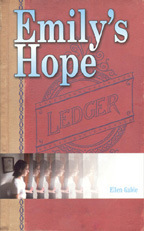 The Kindle edition of my first book, Emily’s Hope, is FREE today through Monday on Kindle!
The Kindle edition of my first book, Emily’s Hope, is FREE today through Monday on Kindle!
Some people have coined my book “NFP Fiction.” It’s based on the true stories of myself and my great-grandmother. Here are a few reviews:
“Compelling…a real page turner.”
Damon Owens, Host of EWTN’s “NFP: Embracing the Marital Gift”
“Your book is a vehicle for the whole truth behind the Theology of the Body, presented so that people can see how the teachings of the Church are to be followed.”
Joan Hon, author, “A Trip to Medjugorje”
“There is so much to love about Emily’s Hope — the innocence of young love, the beautiful, miraculous, healing power of love and the beauty of sacrificial married love and its life-giving splendor. This story is not a fantasy, but is a tender and sensitive portrayal of what makes love real and lasting.”
Jean Heimann, Catholic Fire
“This book is a must read for anyone who has ever questioned whether living the NFP lifestyle is worth it or ever been resentful of the deprivations of NFP. I loved this book!”
Christopher Blunt, author, “Passport”
“I would encourage everyone to read this book, certainly young women. It is a book I can wholeheartedly recommend.”
David Beresford, Catholic Insight Magazine
“While this book is definitely about NFP, it is also about the love of husbands and wives, the love of parents for their children and the agonizing moral choices we sometimes face. It is also about real people…and about being witnesses to a culture of life in a world overshadowed by a culture of death.”
Kristie Wellman, One More Soul
To read more reviews, click here: Emily’s Hope Kindle Edition.
Emily’s Hope will be available FREE on Kindle until Monday, March 7th!


March 1, 2016
Fasting: The Solution to Many Problems
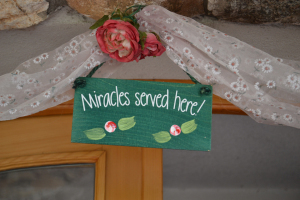
Image from Fotolia
My latest post at Catholic 365:
Wars, persecutions, terrorism, famine, greed, abortion, oppression, immorality, human trafficking, indifference, addictions, suicide, divorce: one need only look at the state of our world and at our own lives to know that there is a spiritual war going on, a battle between good and evil.
Many of us feel helpless. Some may even feel hopeless. We might ask, “What could an insignificant person like me do to combat the evil atrocities and immorality of the world today?”
There is something we can do! It’s a solution that might seem simple, but it’s an extremely powerful weapon against evil. That solution is fasting. Prayer and fasting as a team are very powerful weapons in own our spiritual battles as well as the spiritual warfare happening in the world. Jesus, the apostles, the saints, popes and many clerics have fasted and have urged others to do so.
Fasting opens our hearts to conversion and gives weight to our prayer intentions. Fasting strengthens us in resisting temptations and frees us from addictive behavior. Fasting promotes peace in our hearts and peace with one another. Fasting teaches us the difference between wanting and needing and reminds us of the plight of the poor. Fasting invites the Holy Spirit in to heal our hearts, our relationship with God and our relationship with others. The late Fr. Slavko Barbaric said, “Fasting will lead us to a new freedom of heart and mind.”
St. Jean Vianney said, “The devil is not greatly afraid of the discipline and other instruments of penance. That which beats him is the curtailment of one’s food, drink and sleep. There is nothing the devil fears more, consequently, nothing is more pleasing to God.” Satan hates fasting. Why? Because those who practice the regular self-denial of fasting increase in virtue and grow closer to Christ. Those who fast for others are generously denying themselves for others.
Lent is an ideal time to begin the penitential practice of fasting and self-denial. Scripture and Catholic tradition have always placed a great deal of emphasis on fasting and prayer. In the past 50 years, however, fasting has become less important to the modern day Catholic and many Catholics have become lazy in their faith. The self-denial of fasting is exactly the solution to the world’s problems and to our own eternal life.
Lent is a training ground, much like the 40 days fasting in the desert was training ground for Jesus, especially when He was tempted by Satan. During His time in the desert, Jesus was preparing to take up His own cross, to suffer a painful death, to redeem all mankind.
We all want to be prepared for eternal life. The penitential season of Lent with the self-denial of fasting can be our training ground and helps to prepare us for both our future crosses and for our eternal life. Fasting trains us in self-knowledge and is a key tool for mastery over one’s self.
Fasting allows us to help others, even strangers we’ve never met. It’s a generous, selfless act because when we fast and pray for someone in particular, fasting gives weight to our prayers for that person. Pope Francis said, “Fasting makes sense if it really chips away at our security and, as a consequence, benefits someone else, if it helps us cultivate the style of the good Samaritan, who bent down to his brother in need and took care of him.”
In Scripture, (Matthew 6) Jesus tells us how to pray, then immediately tells us to fast: “When you fast, do not look gloomy like the hypocrites.”
Jesus says, “When you fast,” not “if you fast.” Fasting and prayer are a team and are extremely powerful weapons against the evil one. “The disciples asked Jesus, ‘Why couldn’t we drive it (demon) out?’ He replied, ‘This kind can come out only by prayer and fasting.’” Mark 9:27-29
Fasting is responsible for many miracles throughout history. One miracle happened in Hiroshima, Japan. Eight Jesuit German priests fasted and prayed the rosary daily before the Atomic bomb hit in August 1945. Their parish house was only eight houses away from the center of the atomic bomb blast. Although most people within a one-mile radius of the blast were either killed instantly or died afterwards from radiation poisoning, none of the priests suffered more than a scratch, and none of them ever experienced any after-effects of radiation. Doctors kept track of them for years and none of the priests ever suffered any ill effects. (To read about more fasting miracles, click here.)
Cardinal Robert Sarah of Guinea recently revealed his secret weapon for spiritual warfare: prayer and fasting. When he first became an archbishop, Cardinal Sarah made a commitment to do a three-day retreat every two months. During these retreats, he completely fasts from both food and water, and takes with him only the basic supplies for Mass, the Bible, and other spiritual reading. He says this has helped him “to recharge and return to the battle.” (source: http://www.catholicherald.co.uk/issues/february-5th-2016/meet-the-cardinal-who-recharges-for-battle-by-fasting-from-food-and-water/) Of course, there’s nothing new about prayer and fasting: Jesus fasted and commanded his disciples to do the same. If an elderly cardinal can fast, then we all can fast.
Another high ranking cleric, Bishop Olmsted of the Diocese of Phoenix, has recommended fasting in his exhortation, “Into the Breach.” “Turning away from the passions of the flesh, Jesus rejected Satan’s offering of bread in the desert, and in the Sermon on the Mount, twice He instructs us to fast (Matthew 6:16). Notice that the Lord does not say “if you fast” but rather “when you fast.” Fasting is training in self-knowledge, a key weapon for mastery over oneself. If we do not have dominion over our passions, especially those for food and sex, we cannot possess ourselves and put the interests of others in front of our own.”
There are so many great reasons to fast, but prayer and fasting as tools for spiritual warfare is one of the most important. Lent is an ideal time to begin the regular practice of self-denial. For those who cannot fast from food (like the sick, pregnant and elderly), they can choose to fast from television, social networking and other pleasurable activities on fasting days.
Lent is a time of change and sacrifice. Fasting and prayer together is the solution to the spiritual warfare that is going on in the world and in our own lives. Remember that Satan, the father of lies, hates fasting.
Fasting is not an easy practice with our society’s current tendency to overindulge. However, if you can do penitential acts during Lent, if you can fast during Lent, then you can fast all year round!
For more information on how to get started with fasting, check out our website (http://livethefast.org) Always check with your physician before beginning any fasting routine.
To sign up for our free biweekly fasting newsletter, click here.
Live the Fast is a Roman Catholic Apostolate that is focused on bringing more awareness to the discipline of fasting by offering educational resources on prayer and fasting, a prayer community that will inspire one to live the fast and providing nutritious fasting breads. (Priests and religious receive fasting breads and resources free of charge.)


February 24, 2016
A Sea of God’s Mercy – Catherine Doherty
This is a beautiful reflection on God’s Mercy by Catherine Doherty which is so relevant during this Year of Mercy! 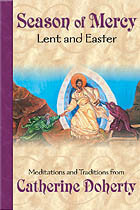 This excerpt is from her book “Season of Mercy,” published by Madonna House Publications:
This excerpt is from her book “Season of Mercy,” published by Madonna House Publications:
I was praying and it came to me that Lent is a sort of sea of God’s mercy. In my imagination Lent was warm and quiet and inviting for us to swim in. If we did swim in it, we would be not only refreshed but cleansed, for God’s mercy cleanses as nothing else does.
Then I thought of our reticence. I don’t know if it is reticence or fear to really plunge into God’s mercy. We really want to be washed clean; we want to be forgiven. But these desires meet with something else inside. I say to myself that if I do enter into the sea of mercy I will be healed, and then I will be bound to practice what Christ preaches, his law of love, which is painful, so terribly painful. There by that sea I stand and think: If I seek mercy I have to dish out mercy; I have to be merciful to others.
What does it mean to be merciful to others? It means to open my own heart, like a little sea, for people to swim in.
If we stand before God’s mercy and drink of it, it will mean that the Our Father is a reality, and not just a prayer that I say. “Our Father who art in heaven, hallowed be thy name. Thy kingdom come…” We like that part and have no problem saying it.
But then we come to: “Thy will be done on earth as it is in heaven…. Forgive us our trespasses as we forgive those who trespass against us.” We shake our heads and say, “Yes, it’s Lent; it’s true we should be forgiving everybody.” But we don’t like trespassers. If strangers come to use our beaches we will say to ourselves: What are they doing here? Why do they come to our beach? It’s not easy to make of one’s heart a little sea of mercy for the other.
We should also be listening to God’s will. But we think: Wait a second! “Thy will.” What does that mean?
It means many things. For instance somebody is thinking of entering a convent and they say, “Well, I don’t know; I’m afraid. Maybe I won’t measure up.” Silly people! Of course they won’t measure up, but God will measure up for them. If he calls them, he’ll give them the grace. As we look at the will of God—to go to a convent or to marry or to just live in the world in the conditions of today, to submit oneself to somebody else—our hackles rise up against authority. To submit to the will of God would be to put our toe in the sea of God’s mercy.
Lent relentlessly moves on and shows us who we are—our true identity as Christians, what it means to be Christian.
The mercy that we must give to others includes that of standing up for the poor, the lonely, those who have no education and cannot stand up for themselves. It means to engage in what we call social justice on behalf of our sister and brother. That involves opening ourselves to being pushed around and crucified. This always happens to those who stand up for others. Do we want to go into the sea of God’s mercy, to be washed clean so that we begin to do the things of Christ?
What is this Lent all about? It is to go into some strange and incredible depths of ourself and there to meet the sea of God’s mercy and swim in it, having shed all garments, garments of selfishness and fear.
Take for instance the fear of ridicule. Christ said to St. Francis, “I want you to be the greatest fool that anyone ever saw.” Did you ever stop to think what an absolute foolishness Christ is? It borders on idiocy, not mental idiocy, but a sort of passionate foolishness. Just think of a human being letting himself be crucified for someone else—in this case for the world. How high can the foolishness of love go? How deep, how wide? That’s the foolishness he wants us to assume.
There was a little Franciscan brother, Juniper, who used to play see-saw with children; people thought it funny for a man to do that. He did it specifically so that people would ridicule him. Lots of saints went about being ridiculed. The Russian urodivoi—fools for Christ—loved to open themselves to ridicule. They wanted to play the fool to atone for those who call Christ a fool.
Those are extremes of people falling in love with God so totally that they desire ridicule. But what about us? Are we going to allow Lent to give us the Holy Spirit’s immense gift of fortitude? It is a gift that is little spoken of and is neglected. Fortitude is courage, the courage of our convictions. Christ said, “Who is not with me is against me.”
Lent is here to remind us that the mercy of God is ours, provided we embrace his law of love; provided we realize that it’s going to hurt, and hurt plenty, but that the very hurting will be a healing. That is the paradox of God, that while you hurt, you heal. That’s true healing.
The sea of his mercy is open before us. Lent definitely and inexorably leads us to it and makes us think about what it takes to swim in it. Lent also reminds us that each of our hearts can be a sea of mercy and forgiveness to others. This is a very great shortcut to God’s heart.
The Pass It On! articles are free to use under the terms of a Creative Commons License.


February 19, 2016
What Did the Pope Actually Say?
Pope Francis did not approve contraception to avoid the Zika virus. Here is an excellent response to today’s media frenzy:
Vatican City, Feb 18, 2016 / 02:06 pm (CNA/EWTN News).- Despite a rush of headlines claiming Pope Francis is softening the Church’s stance on contraception, a closer look at his recent remarks could suggest otherwise.
During an in-flight press conference on his way back from Mexico, Pope Francis was asked by a reporter about the threat of Zika virus in many Latin American countries.
Noting that the virus may be linked to birth defects when transmitted from a pregnant woman to her unborn baby, the reporter asked the Holy Father about proposals involving “abortion, or else avoiding pregnancy” in areas where Zika virus is prevalent.
The Pope responded by emphatically stating that abortion is “a crime” and “absolute evil” that cannot be justified. He also spoke on the topic of avoiding pregnancy.
“Paul VI, a great man, in a difficult situation in Africa, permitted nuns to use contraceptives in cases of rape,” he said.
Seven sentences later, he added another comment. Not mentioning contraception specifically, he simply said that “avoiding pregnancy is not an absolute evil. In certain cases, as in this one, or in the one I mentioned of Blessed Paul VI, it was clear.”
Numerous news outlets suggested that the Pope was introducing a change – or at least a softening – in previous teaching.
However, Dr. Melissa Moschella, a philosophy professor at The Catholic University of America, suggested that this may not be the case.
When talking about avoiding pregnancy in connection with the Zika virus, the Pope may not necessarily have been implying artificial contraceptive use, but may have been referencing Natural Family Planning, she said.
Normally, if a married couple faces a serious reason to avoid pregnancy, the Church teaches that they may do so through Natural Family Planning, a process that involves identifying a woman’s fertile periods and abstaining from sexual activity during those times.
To read the rest of the article, click here.
(Source: Catholic News Agency/EWTN)


February 14, 2016
The Story of How We Met: “Please, God, Send Me a Man”
Since this is Valentine’s Day, today’s post is an excerpt of James and my courtship story (which was the basis for my first novel, Emily’s Hope) and which is included in Come My Beloved.
Ellen: Because I was very young looking, I did not date in high school or for the year or so after. I longed to meet someone, that special person with whom I could spend the rest of my life. Every night I prayed, “Please God, send me a man.”
During my first visit to Canada in 1978, my pen-pal asked if I wanted to go with her to a jam session where her brother would be rehearsing with his rock band. When we arrived, the band was taking a break. One boy, however, was crouching, with his back toward me, a guitar in front of him, and he was playing the same three or four notes over and over again. I remember thinking that fellow must be dedicated. I also noticed that he had dark curly hair and bell bottoms (out of style at the time) which prompted me to think he must not be too concerned about fashion. A few moments later, the band members took up their instruments. The fellow with the dark curly hair turned around and began playing his guitar and singing. It sounds cliché, but when I first saw his face, he took my breath away. And he played with such intensity that I couldn’t stop staring at him.
James: I wasn’t much for pursuit, except pursuit of excellence in music and art. That seemed so much easier to understand than girls. Ellie, on the other hand, was definitely in pursuit and had a hard time hiding it, even if she tried. One thing is for sure, though, her young looks were less intimidating for someone as shy as myself.
Ellen: I returned to Canada the summer of ’79. Although I was 20 at the time, I looked more like 13 and was rather immature. I was told that James was shy and usually quiet, but when we later met at a dance in the local curling club, we spent the entire time outside (where it was less noisy) talking for three hours. I was nervous because I liked him so much. I actually began the conversation by asking him a “conversation starter” that my pen-pal had given me in case I became nervous. “Nice trees around here,” was all I could come up with. His answer surprised me. “Yes, they are nice. I like the way the light is reflecting off the oak leaves over there.” I never expected such a well-thought out and creative answer to a conversation starter. But as we began to talk, I realized that he was no ordinary young man.
James: It’s funny that although I would have gladly stood on a stage and produced a wall of loud noise to perform at any dance, I wasn’t much for attending them. I certainly saw the empty meanings of much popular music, and spending time outside of the noisy dance hall was a definite option, especially when this time was to be spent getting to know a person from a different part of the continent, a girl, in fact, who seemed to want to get to know me. When time flies by so fast you can’t keep track of it, you know you’re having fun and I certainly felt comfortable chatting with Ellie that night. So comfortable that I almost couldn’t face the discomfort of having to see her return home.
Ellen: Later that week, when we said good bye to one another, he promised that he would write to me. I arrived back in New Jersey and immediately wrote my first letter to James.
In those days, we didn’t have email or cheap long distance or texting, so he had to wait over a week before he received my letter. I had to wait two weeks before receiving a response. When I received his first letter, I knew he was the real thing. Over the next few months, he sent letters frequently and drew little pictures on the backs of envelopes or in the letters themselves, little pencil sketches of scenes, lions or the cartoon version of himself. On one particular envelope, he drew a man crawling over the desert, passing a glass labeled “H20” and saying “Ellen, Ellen.” On another, he drew a picture of me pulling on a phone wire with him saying “Keeping pulling. I’m just passing Syracuse.”
As we began to share thoughts and feelings over the next five months, I became more and more excited at the prospect that he was the man with whom I was meant to spend the rest of my life.
James: I must admit, I wasn’t much of a pen-pal and the only person I had ever or would ever write letters consistently to was Ellie. The delay between one writing and the other responding was frustrating, but it added a certain timeliness to my letters’ content. I tended to write things that would matter regardless of when Ellie read them. One thing is for sure: Ellie’s ceaseless and timely response to every letter I wrote definitely convinced me that there was someone who really cared about me, helping to cement my certainty that I was developing a relationship that was going to work. If she was putting aside the distractions of life just to make sure I got a response every few days, how much more would she truly be able to commit herself to being my lifelong partner when we were near each other?
Ellen: On returning to Canada just after Christmas 1979, James presented me with a beautiful painting (see photo above). When James and I were alone together, we pledged our love to one another and promised that we would be faithful. I was overjoyed because I had finally found the one I loved but unfortunately, he lived 500 miles away. I had no idea what it would mean to carry on a long distance relationship for an unknown number of years, but we were in love and it didn’t seem to matter when we were together.
Although I was Catholic — and had discovered that he was also Catholic — I figured that James was like most Catholics who didn’t follow everything that the Church taught. I wanted to give myself to him physically before I left during that visit so we would have something to hold us together. He was only 17 at the time, but he shared with me that he wanted to wait until marriage to have sex. I was shocked that a 17 year old would turn down an opportunity like that, but in hindsight, his high ideals for morality and “pursuit for excellence in art and music” are the exact traits which attracted me to him in the first place.
We spent the rest of the week trying to enjoy the few days we had left together. When it came time to say goodbye, we both sobbed. Neither of us knew when we would see each other again.
This is an excerpt of our courtship story. The full version is included in Full Quiver’s book: Come My Beloved: Inspiring Stories of Catholic Courtship. (It’s currently FREE on Kindle!!) Our story has also been fictionalized in my novel, Emily’s Hope.
This is our 37th Valentine’s Day together! Happy Valentine’s Day to my true love!
Copyright 2016 James and Ellen Hrkach and FQ Publishing



